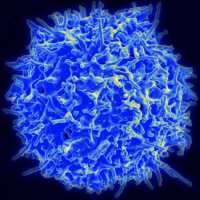Cancer clinical trials - placebos?

my chemo nurse told me she would never participate in a clinical trial if she had cancer because even in cancer trials they have a control group that are only given placebos. And no other treatment throughout the trial. Is this true? People with cancer can’t just go without treatment!
Comments
-
I have NEVER heard of placebo for cancer
If a placebo was involved, you would first be advised and agree to sign consent before joining the trial. I have been in four clinical trials now and none of them offered a placebo. I have never heard of a placebo involved in any potentially fatal illness. Who would participate, having active cancer? Was that a hematology nurse? I hope not.
0 -
Good point, Po!po18guy said:I have NEVER heard of placebo for cancer
If a placebo was involved, you would first be advised and agree to sign consent before joining the trial. I have been in four clinical trials now and none of them offered a placebo. I have never heard of a placebo involved in any potentially fatal illness. Who would participate, having active cancer? Was that a hematology nurse? I hope not.
Yes, in a Phase II/III trial, the test chemo migh be added to conventional therapy or one group would get conventional therapy and the other group get conventional + new drug. But you can look at this question for yourself at clinicaltrials.gov to see how studies are structured.
0 -
Good to knowpo18guy said:I have NEVER heard of placebo for cancer
If a placebo was involved, you would first be advised and agree to sign consent before joining the trial. I have been in four clinical trials now and none of them offered a placebo. I have never heard of a placebo involved in any potentially fatal illness. Who would participate, having active cancer? Was that a hematology nurse? I hope not.
Po, that’s good to know, that your trials didn’t have a placebo. I don’t see how a trial could even do that to someone with cancer so I hope it’s not happening. I certainly wouldn’t participate in a cancer clinical trial if I had to sign something stating that placebos would be used. But I do know one person who claims her mother died of cancer while participating in a trial because she was getting a placebo and no other treatment and didn’t know she was getting a placebo. I don’t have any of the details of what kind of cancer she had or anything else though. I don’t know if my chemo nurse is a hematology nurse or not.
0 -
Look it up
It is really worth looking up how studies are conducted, rather than relying on anecdotal information, IMO. Go to clinicaltrials.gov, select disease "Lymphoma" and put in key word "placebo". You will get a lot of results that look like this: "The purpose of this study is to evaluate whether copanlisib in combination with rituximab is superior to placebo in combination with rituximab in prolonging progression free survival (PFS) in patients with relapsed iNHL who have received one or more lines of treatment..." So, placebo plus, not placebo alone.
0 -
Well, trials don't "do that" to patientsgbread said:Good to know
Po, that’s good to know, that your trials didn’t have a placebo. I don’t see how a trial could even do that to someone with cancer so I hope it’s not happening. I certainly wouldn’t participate in a cancer clinical trial if I had to sign something stating that placebos would be used. But I do know one person who claims her mother died of cancer while participating in a trial because she was getting a placebo and no other treatment and didn’t know she was getting a placebo. I don’t have any of the details of what kind of cancer she had or anything else though. I don’t know if my chemo nurse is a hematology nurse or not.
100% of everything involved in a clinical trial, at least in the US, is absolutely voluntary. Don't like it? Don't agree? Drop out. That simple. And, the trial consent forms will absolutely spell out the options that you will be receiving. An experimental drug must demonstrate a known advantage over an already approved drug before the FDA will approve it. Without that approved regimen as a control, there is no reason at all for a drug company to gamble 2-5 BILLION dollars on developing the drug. No, you get one drug, the other, or perhaps one of three or more drugs. It will all be explained to you and you will be given copies of all relevant paperwork.
No reason to stress over this, as your life is stressful enough. You have every reason to look forward to a trial with great expectation, since there is no defined treatment for the startlingly wide variety of T-Cell Lymphomas. Your participation in a trial will help to establish that for future patients. Also, you will have the advantage of receiving state of the art treatment years before anyone else receives it.
0 -
LocalEvarista said:Look it up
It is really worth looking up how studies are conducted, rather than relying on anecdotal information, IMO. Go to clinicaltrials.gov, select disease "Lymphoma" and put in key word "placebo". You will get a lot of results that look like this: "The purpose of this study is to evaluate whether copanlisib in combination with rituximab is superior to placebo in combination with rituximab in prolonging progression free survival (PFS) in patients with relapsed iNHL who have received one or more lines of treatment..." So, placebo plus, not placebo alone.
My cancer center, a Medical School Hospital, conducts Level I, II, and III clinical oncology trials, in addition to the highest levels of accreditation with Stem Cell Transplantation.
While I have never participated in a cancer drug trial, I have read most of their literature. It states clearly that all participants receive at least best current therapies, or those therapies plus the trial drug(s).
A person would be a fool to agree to potentially no treatment (i.e., placebo only) with active cancer or other deadly medical condition. I cannot imagine drug company lawyers ever agreeing to such a scenario.
max
0 -
What Max saidLocal
My cancer center, a Medical School Hospital, conducts Level I, II, and III clinical oncology trials, in addition to the highest levels of accreditation with Stem Cell Transplantation.
While I have never participated in a cancer drug trial, I have read most of their literature. It states clearly that all participants receive at least best current therapies, or those therapies plus the trial drug(s).
A person would be a fool to agree to potentially no treatment (i.e., placebo only) with active cancer or other deadly medical condition. I cannot imagine drug company lawyers ever agreeing to such a scenario.
max
Tylenol was probably "trialed" with a placebo. So also with Ibuprofen, allergy medications, cough syrups, etc. But I do not know of any climincal trial regarding a potentially deadly condition - cancer or not - that has offered a placebo. That is not the "best practice" of medicine which is required in all such endeavors.
0 -
Thank you MaxLocal
My cancer center, a Medical School Hospital, conducts Level I, II, and III clinical oncology trials, in addition to the highest levels of accreditation with Stem Cell Transplantation.
While I have never participated in a cancer drug trial, I have read most of their literature. It states clearly that all participants receive at least best current therapies, or those therapies plus the trial drug(s).
A person would be a fool to agree to potentially no treatment (i.e., placebo only) with active cancer or other deadly medical condition. I cannot imagine drug company lawyers ever agreeing to such a scenario.
max
i agree, if one had a potentially deadly disease they would have to be a fool to participate in a trial in which they might only get a placebo. I was surprised when my chemo nurse told me that and I didn’t see how it could be true.
0 -
For what its worth .....
My understanding, and I do not claim to know a lot about it, is that use of placebos in these cancer trials is illegal in US. I know that as recently as 2011, drug companies were testing new drugs in Italy where placebos are commonly used, even for fatal diseases. This info is from my now deceased sister who had an extremely rare form of cancer and looked at entering trials but decided against it.
Unfortunately, I too have received some inaccurate info from infusion nurses and GP doctors too. Trust but verify. Gotta luv em but remember they are not oncologists.
0
Discussion Boards
- All Discussion Boards
- 6 CSN Information
- 6 Welcome to CSN
- 122.1K Cancer specific
- 2.8K Anal Cancer
- 448 Bladder Cancer
- 309 Bone Cancers
- 1.6K Brain Cancer
- 28.5K Breast Cancer
- 398 Childhood Cancers
- 27.9K Colorectal Cancer
- 4.6K Esophageal Cancer
- 1.2K Gynecological Cancers (other than ovarian and uterine)
- 13K Head and Neck Cancer
- 6.4K Kidney Cancer
- 673 Leukemia
- 795 Liver Cancer
- 4.1K Lung Cancer
- 5.1K Lymphoma (Hodgkin and Non-Hodgkin)
- 239 Multiple Myeloma
- 7.2K Ovarian Cancer
- 65 Pancreatic Cancer
- 490 Peritoneal Cancer
- 5.5K Prostate Cancer
- 1.2K Rare and Other Cancers
- 543 Sarcoma
- 738 Skin Cancer
- 658 Stomach Cancer
- 192 Testicular Cancer
- 1.5K Thyroid Cancer
- 5.9K Uterine/Endometrial Cancer
- 6.3K Lifestyle Discussion Boards



